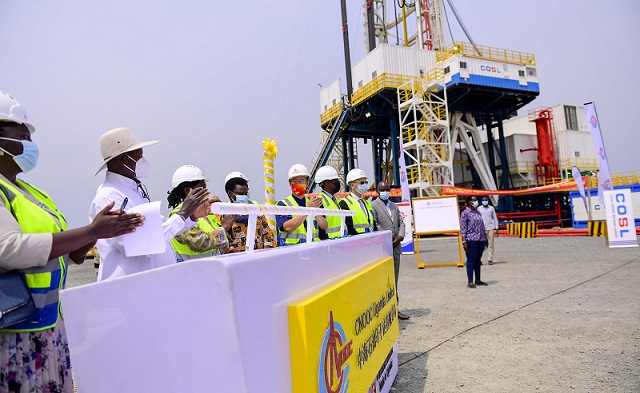Kingfisher oilfield is expected to produce 40,000 barrels each day when production is at its peak, while Tilenga is expected to produce 190,000 barrels. Both form a key part of a major national project expected to be completed within two years.
Read More: Empowering Africa: The Impact of Digital Literacy on Cultural Knowledge
Uganda is estimated to have recoverable oil reserves of at least 1.4 billion barrels. Drilling began in January this year (2023), the project is expected to be completed within two years. Speaking on behalf of the Petroleum Authority of Uganda, corporate affairs manager Gloria Sebikari says the country is on track to begin producing oil by 2025.
She says $6.9 billion (USD) worth of contracts are being awarded, $1.8 billion (USD) of those will go to local companies. Sebikari says work on the 897-mile (1,443-kilometer) East African Crude Oil Pipeline (EACOP) is expected to begin this year. It will be the world’s longest heated oil pipeline, transporting crude from fields near Lake Albert in western Uganda to Tanzania’s Indian Ocean port of Tanga.
The $2.5 billion dollar project provoked concern from groups who argue the pipeline poses serious risk to the environment. Some oil wells are to be drilled within Uganda’s Murchison Falls National Park, where the Nile plummets 130 feet (40 meters) through a gap just 20 feet (6 meters) wide.
Read More: Botswana signs new diamond sales deal with De Beers
The surrounding wilderness is home to hippos, egrets, giraffes and antelopes. The pipeline would then pass through seven forest reserves and two game parks, running alongside Lake Victoria, a source of freshwater for 40 million people.
That ecological fragility is one reason why some activists oppose the project despite assurances from TotalEnergies that the pipeline’s state-of-the-art-design will ensure safety for decades.
On Tuesday (26 June 2023) environmental groups brought another legal case against TotalEnergies in the French courts, the civil suit filed in Paris came four months after the collapse of a similar case brought by activists.
The new litigation cites TotalEnergies’ alleged failure to comply with France’s “duty of vigilance” law and seeks compensation for the company’s alleged violations of land and food rights over six years. TotalEnergies has long denied the allegations.
Read More: The Way for a Thriving & Inclusive Economy –Mara Zhanet Michelo
Aside from environmental concerns, some say Uganda’s plans to tap oil from Lake Albert may cause tensions with the Democratic Republic of Congo due to their close border. Felix Ocitti, manager of operations and compliance at Petroleum Authority of Uganda, says they’ve already put measures in place to resolve that.
